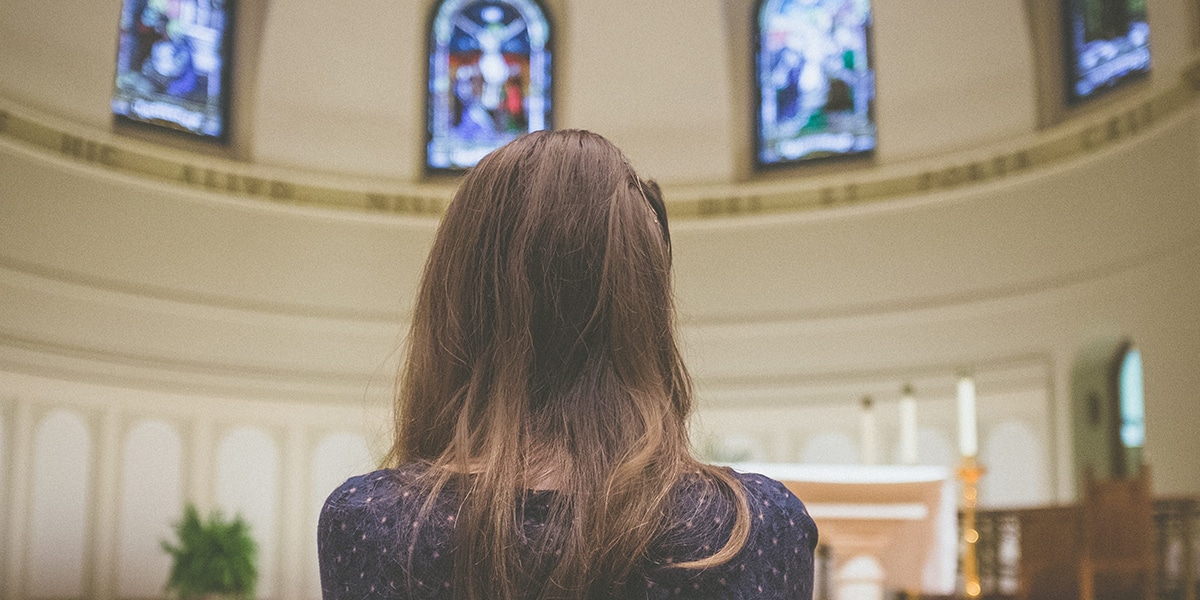The prayers we learned in childhood don’t have to be left there.
Earlier in my life, I was wary of formulaic prayer—the Catholic prayers I’d grown up with. I’d listened to Protestant friends who condemned repetitious prayer based on the line from Jesus in Matthew 6:7: “In praying, do not babble like the pagans, who think that they will be heard because of their many words.” Or, in other versions: “Don’t use vain repetitions.”
I’d observed people who seemed to use standard prayers as magic—in a superstitious sort of way. They seemed to worry that they might not get that house or promotion or cure because they were short one Hail Mary.
I’d prayed, I thought, from the heart, in my own words, and also silently. I felt as if I’d reached a deeper level of sincerity than I had with traditional, recited prayers. On some level, I considered this kind of traditional prayer outdated, something that might fade away with the older generation. I felt that truly spiritual people outgrew this kind of approach to God.
I can’t pinpoint exactly the moment all this changed and I returned to the prayers of our tradition. I do know that I attended informal First Friday mini retreats at the parish I went back to after decades away from the Church. And partly to be respectful and polite, I learned to participate again—in the Divine Mercy Chaplet, in the prayers for Holy Hour. And I loved it. A couple of rosaries fell into my hands. My hands, more than my mind, remembered the way around the beads. The words came back; they just followed my fingers. And I loved it.
More recently, after a few years of the habit of daily Mass, I found myself going in the middle of the day rather than in the morning, now and then. Just before noon, I’d find myself on my knees with everyone else, saying the Angelus. It came back to me from childhood, across decades, across centuries.
And so today I put down a few words to defend, encourage, and promote the use of our traditional Catholic prayers.
The Prayer Connection
First, they are not only prayers that lift our minds, hearts, and souls to God when prayed thoughtfully and sincerely, but also prayers that connect us. They link us to all the saints who have prayed these prayers, all the faithful who have prayed these prayers, all the priests, religious, Catholic educators, and parents who taught us these prayers. We’re connected to all in our parishes and throughout the world who are saying these prayers in a multitude of languages today.
Many of us, in saying these prayers, are layering our voices and hearts onto those of our own grandparents and our ancestors before them. This is what tradition is. This is what tradition does. In addition, all our internal and external voices are continuous, much like the Mass or the Liturgy of the Hours, in offering our united lives, thanks, praise, petitions, and contrition to God.
I love that connection.
I also think about the depth of these prayers in terms of their application at various stages of our lives. I think about how the very connections mentioned above are anchored in childhood when a child is taught to pray like this. I think of the comfort and love children can experience during regular prayers with parents, and I like to think of children absorbing, like a seed absorbing nutrients or an embryo absorbing nourishment, things that they need to grow spiritually—things that will take them to the very heart of the mysteries of these prayers, of God—all below-the-surface “babbling.” I think of the meanings of the words unfolding over the course of childhood and young adult years, and into middle and old age.
I was probably in my 40s before I experienced the cumulative shock of a sincerely prayed, thoughtful Hail Mary, the never fully grasped rightness and truth contained in a Glory Be. All of the desires of God and the needs of our souls—and a blueprint for the unfolding of the world—are present as the words of the Lord’s Prayer are voiced.
It was during a normal babbling of the rosary that I suddenly began to appreciate the mysteries. I think of a babbling brook becoming a creek, flowing into a river, and finally pouring out into the great, vast sea. The water babbles all the way, gaining force, and suddenly a mystery opens. Or at least we get a glimpse of it and can stand, stunned, at its unknowable expanse and depth.
Prayers That Sustain Us
These prayers operate in our subconscious. And that’s why memorization is so important. That’s why it’s not a bad thing that we learn these prayers to a point where we can say them mindlessly. During dark times, during times of trial and fatigue, when our own words are perhaps silenced or we don’t find our own thinking trustworthy, we might not be able to come up with sincere expressions of thanks, praise, trusting petition, or contrition.
When we’re so dog-tired or stressed we can’t even sleep, we might not be able to spontaneously pray or meditate. Or we might have trouble, say, in anger, in traffic, or at a sickbed, when it’s hard to express the conflicting love and everything else we might feel. I have found that there is something I still can do: I can cling to my beads and say those repetitive rosary prayers and invite all of heaven—and sometimes others on earth—to join me. And God does something with that, under and above the place of thought.
I am living with a father who is in the early stages of dementia. I know some others who are in more advanced stages. So I have been reading about it. One of the things I’ve tried to think about is how spirituality is connected to all of this. How does a person lift a mind that isn’t fully there to God?
Research indicates that these people function best when anchored in repetitive things from the past: old songs, old habits, old prayers. The farther back the songs, habits, and prayers go, the deeper they are ingrained, and the more likely it is that they will not be completely lost. They will retain value for the person and for God.
When prayers are automatic—when our whole subconscious has been steeped in them for decades—there is a greater likelihood that they will provide us a spiritual connection to reality even when other things are failing and fading. They can be a lifeline at the end for some people, sending them on, drawing them over: a chain of beads, a chain of connection, a chain of love to simply hold on to—a chain that links heaven and earth, person and God, as we pray our way around it. I find rosaries in my father’s pockets when I check them before doing laundry. I find them under his pillows when I make his bed. He still knows the prayers.
I believe the meanings of the words grow and unfold as we ourselves do. Maybe we say our childhood Hail Marys. Maybe we read something or hear something and consciously learn to go a little deeper with the Our Father as a young adult. Maybe we get down some more Marian prayers, adoration prayers, or saints’ prayers in middle age. Maybe links are discovered in the words of our old, memorized prayers and new ones we may happen upon and choose to learn.
But sit at a deathbed sometime and say a silent Hail Mary. Say “now and at the hour of our death” and realize that this is a lifetime-deathtime prayer. Say an Our Father: “Thy will be done ” and “forgive us our trespasses as we forgive those who trespass against us.” Understand that these are prayers that accompany us, that grow with us. We need to make a point of continuing to give them to the young. They wrap gifts that can evolve exponentially as we age or as we need them.
Prayers for Midlife and Beyond
I think I was in my early 50s, in my car, when it came to my awareness that I really had a guardian angel. It was a complete surprise. And I might have dismissed it, except for my immediate, unthought-out response. It came to me across decades, my voice together with my mother’s: “Angel of God, my guardian dear, to whom his love commits me here, ever this day be at my side—to light, to guard, to rule, to guide.”
It is a different thing to ask for light, guarding, rule, guidance at 50 than it is at 6. But the same words work. I almost had to pull over to consider my lack of appreciation—my lack of submission and cooperation with light, with a being to guard me, to keep me in line with God’s rule, to guide me. The silliness, the ridiculousness of this moment hit me, of course. But all the saints believed in guardian angels.
When my mother was dying, I remembered her praying with us before we went to sleep at night when we were young. ‘Jesus, Mary, and Joseph, I give you my heart and my soul.’
The Catechism of the Catholic Church teaches their existence. And I was inexplicably happy behind the wheel. I decided to hedge my bets. I now truly believe that such an angel exists for me, for each of us. “My guardian dear.” Who knew? Well, it turns out that I did, all along, the knowledge buried under that early prayer.
When my mother was dying, and I was praying silently beside her bed, I remembered her praying with us before we went to sleep at night when we were young. “Jesus, Mary, and Joseph, I give you my heart and my soul.” I hadn’t heard those words since childhood bedtime prayers. But I didn’t have to think about them. I knew them. “Jesus, Mary, and Joseph, I give you my heart and my soul. Jesus, Mary, and Joseph, be with me in my last agony. Jesus, Mary, and Joseph, may I breathe forth my soul in peace with thee. Amen.” I hope this prayer is so ingrained in me that I can say it as I near my own death, God willing. Again, this is a prayer that spans a lifetime.
God, Ourselves, Others
There are so many of these prayers, different ones special to different people, different needs, different occasions. Of course, we can’t just sit around saying all of them. And, of course, there are other forms of prayer. But steady reliance on a handful of our most treasured Catholic prayers will put us in good stead.
These prayers are concentrated. There is great spiritual power in them. There is great potential for us to grow in them and for them to evolve in us during the course of our lives—connecting us to God at deeper and deeper levels. They help us converse with him, hear him, communicate with him in more and more meaningful ways. They help us lift our minds and hearts to God.
Finally, about those vain repetitions. That babbling. Well, first it was gentile, or pagan, babbling that was condemned. I don’t know what that was—maybe some kind of chant or mantra, maybe just lots of empty words.
At any rate, the words were empty, vain, because they were addressed to idols. There doesn’t have to be anything vain about formal, traditional prayer. It was clear during his temptation in the desert that Jesus had the Scriptures memorized. On the cross, Jesus was repeating, perhaps even singing, lines from a psalm.
If I’m blessed to live for a couple more decades or longer, it will be a comfort to know that younger people carry on our traditional prayers. I pray now that parents and parishes make a point of ensuring this. It is a matter of joy, of peace, to think that another generation will be reciting the familiar prayers of a rosary, for example, repeating, babbling, sending out many words, maybe for souls in purgatory—for me, for all of us.









1 thought on “Saying Our Prayers”
I do frequently just spill my guts out to the Lord. (as if He doesn’t already know)
I ask him to put the pieces of the puzzles in my life in the right order or give me the missing piece.
But – when push comes to shove and I’m at the breaking point – it’s the good ol’ Our Father, Hail Mary, Glory Be that
I run to. When I’m at my lowest point – I go straight to the Sign of the Cross. NOTHING reminds me more of the love of
the Father and the Son and the Holy Spirit – my God.